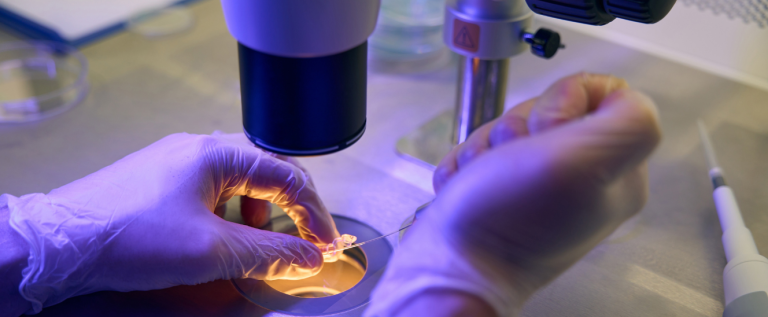Biotechnology is drawing new boundaries for Brazilian livestock production. With scientific advances that go far beyond conventional practices and pave the way for a new era of efficiency and ethics in animal production.
The development of recombinant proteins, applied genetic engineering, and synthetic biology are enabling innovative solutions to historical challenges in the sector, such as dependence on invasive and controversial methods for obtaining biological inputs. This biotechnological evolution improves production indices and responds to global demands for sustainable practices and animal welfare, positioning Brazil as a protagonist in the global bioeconomy.
In a scenario where applied science becomes a competitive advantage, Brazilian technology-based companies are developing solutions that combine high performance with environmental and ethical responsibility, transforming challenges into opportunities for disruptive innovation. Check out the solution presented at Agrishow Labs 2025!
The Ethical Challenge in Animal Reproduction
For decades, the livestock industry has faced a significant ethical dilemma: the dependence on hormones extracted from animals for reproductive protocols. The main one, eCG (equine chorionic gonadotropin), traditionally obtained from the blood of pregnant mares, involves practices considered cruel, often including the interruption of pregnancy after extraction.
This archaic method raises serious animal welfare concerns and presents health risks due to the presence of impurities in the biological material, potentially causing inflammation in treated animals. With growing social and regulatory pressure for more ethical practices in animal production, especially in European markets, the sector urgently needed an alternative.
Recombinant Technology: 100% Brazilian Solution
Kimera Biotecnologia, a Brazilian startup presented at Agrishow Labs 2025, has developed an innovative solution that is transforming this scenario: Follimera r-eCG, a recombinant hormone produced entirely in the laboratory, without any use of animals in the process.
“Kimera’s hormone is produced entirely in the laboratory without the need to extract blood from mares or any other animal, and at a much lower cost,” explains the
company. This technology, patented in Brazil, Europe, and the USA, represents a significant advancement for the animal reproduction sector.
Kimera’s mission is to end the practice of animal abuse by offering a recombinant hormone, manufactured 100% in the laboratory, accessible and with higher success rates in reproduction.
Impact on Livestock Productivity
Reproductive biotechnologies such as Fixed-Time Artificial Insemination (FTAI), Embryo Transfer (ET), and In Vitro Fertilization (IVF) are fundamental for increasing the reproductive efficiency of Brazilian herds. Kimera’s r-eCG enhances these protocols with significant advantages:
· Greater purity and efficacy – Being produced in a controlled environment, it presents less variability between batches
· Reduction of health risks – Eliminates the risk of cross-contamination between species
· Predictability of results – Allows more precise reproductive protocols
· Sustainability of the production chain – Aligns with international market demands for ethical practices
Complete Portfolio for Different Species
The company has already developed a specific line of hormones to meet the needs of different livestock segments:
· Follimera® Cattle – Optimized for FTAI protocols in beef and dairy cattle
· Follimera® Swine – Developed for the reproductive particularities of pig farming
· Follimera® Sheep/Goats – Specific formulation for small ruminants
In addition to hormone production, Kimera also offers customized R&D services for the development of recombinant molecules on demand, meeting specific market needs.
The technology developed by Kimera not only increases the reproductive efficiency of herds but also positions Brazil prominently in the development of technologies such as sustainable animal biotechnology, demonstrating that it is possible to combine high productivity with ethical and responsible practices.





